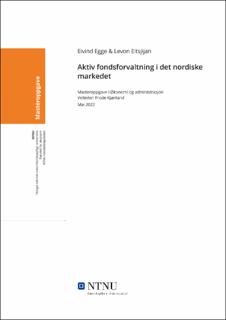| dc.contributor.advisor | Kjærland, Frode | |
| dc.contributor.author | Egge, Eivind | |
| dc.contributor.author | Eltsjijan, Levon | |
| dc.date.accessioned | 2022-09-16T17:20:14Z | |
| dc.date.available | 2022-09-16T17:20:14Z | |
| dc.date.issued | 2022 | |
| dc.identifier | no.ntnu:inspera:112626089:114119106 | |
| dc.identifier.uri | https://hdl.handle.net/11250/3018596 | |
| dc.description.abstract | Aktiv fondsforvaltning er et omdiskutert tema. Forvaltningsselskapene forsvarer den ekstra kostnaden med muligheten for meravkasting. Det er derimot vanskelig for investorene å bedømme hvorvidt den ekstra kostnaden lønner seg, da det ofte foreligger asymmetri i kompetanse. Generelt taler ikke tidligere litteratur for at aktiv forvaltning gir meravkastning. Til forskjell fra eksisterende litteratur utvider vi diskusjonen, da vi undersøker prestasjonen i det nordiske markedet i tidsperioden 2017 – 2021 og koronapandemiens påvirkning. Sentrale diskusjonsmomenter som aktiv andel, påvirkningen av makrofaktorer, kostnader og bærekraftsrangering belyses sammen med mindre kvantifiserbare faktorer. Konklusjonen er at funnene våre føyer seg inn i rekken av eksisterende litteratur om at aktive fond generelt underpresterer referanseindeks. I koronapandemien har ikke forvalterne utnyttet seg av feilprising forårsaket av det endrede markedsforholdet. Til tross for dette påviser vi bedre prestasjon for fond med høyere grad av aktiv andel og tracking error, samt for fondene med kombinasjonen høy bærekraftsrangering og lave kostnader. | |
| dc.description.abstract | Active fund management is a controversial topic. The mutual fund companies defend the extra cost with the possibility of gaining excess returns. On the other hand, it is difficult for investors to assess whether the extra cost pays off, as there is often asymmetry in expertise. In general, previous literature does not suggest that active management provides excess returns. Unlike existing literature, we expand the discussion as we examine the performance in the Nordic market in the period 2017-2021 and the impact of the Covid-19 pandemic. Key discussion topics such as active share, the impact of macroeconomic factors, costs and sustainability rating are highlighted together with less quantifiable factors. The conclusion is that our findings add to the series of existing literature that active funds generally underperform the benchmark index. In the Covid-19 pandemic fund managers have not taken advantage of the general mispricing in the market caused by the changed market conditions. Despite this, we show better performance for funds with a higher degree of active share and tracking error, as well as for funds with the combination of high sustainability rating and low costs. | |
| dc.language | nob | |
| dc.publisher | NTNU | |
| dc.title | Aktiv fondsforvaltning i det nordiske markedet | |
| dc.type | Master thesis | |
